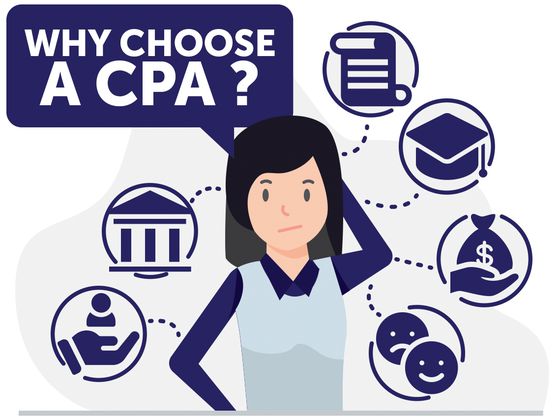How is a Certified Public Accountant (CPA) different from an Accountant?
A CPA is different from an accountant who is not a CPA is many important respects:
- Higher level of knowledge and experience with serving clients
- Greater experience with issues involving independence and objectivity
- Deeper understanding of matters which are not traditionally in the domain of accounting, such as personal financial planning and information technology consulting, but which are related to accounting and serving clients
- Credentials
- More experience working with other professionals such as attorneys, brokers, agents, etc.
Why a CPA?
- Knowledgeable
- Experienced
- Solid decision-making skills
- Up-to-date and forward-looking
- Objective and balanced
- Creative

Why is it a good idea to get the help of a CPA?
The answer depends largely on with whom the CPA is being compared.
A CPA compared to an accountant who is not a CPA...
CPAs, in general, are better qualified than accountants who are not CPAs. They are better qualified because of the requirements for the CPA examination, experience, and continuing education. As importantly, CPAs shine because they are involved with clients as a CPA providing services which a CPA only can provide such as auditing and reporting and certain other special services. If you need an accountant, why not the best - a certified one.
A CPA compared to a professional advisor.
CPAs, in general, are bred to be independent and objective and have intense training and experience with certain decision-making skills including careful research and analysis. Furthermore, their service to clients often involves acquiring knowledge, and as a result, a CPA can provide a client with a perspective that is more balanced and measured, and seeing many angles that can lead to creative breakthroughs.
A CPA compared to doing it yourself.
What qualifications to look for?
To select the right tax, accounting, or personal financial adviser for your needs consider the following list of questions:
- Is the individual a Certified Public Accountant?
- If so, is the CPA licensed in your state? (In New Jersey, call the New Jersey Board of Accountancy at (973) 504-6380 to confirm the CPAs licensee status.)
- To what professional organizations does the CPA belong? To what extent is he or she an active member?
- Is the CPA's personality and expertise compatible with your needs?
What type of services does a CPA offer?
The CPA plays an important role in business and the economy. Possessing technical knowledge and skills, the CPA is trained to apply sound judgment in business situations, helping people and organizations evaluate the use of economic resources. Today's CPA provides a wide range of services to various sectors including, but not limited to, the business and corporate industry and government and nonprofit organizations, playing many roles such as:
- Auditor
- Educators
- Management Consultants
- Personal Financial Planner
- Tax Advisor
- Technology Consultant